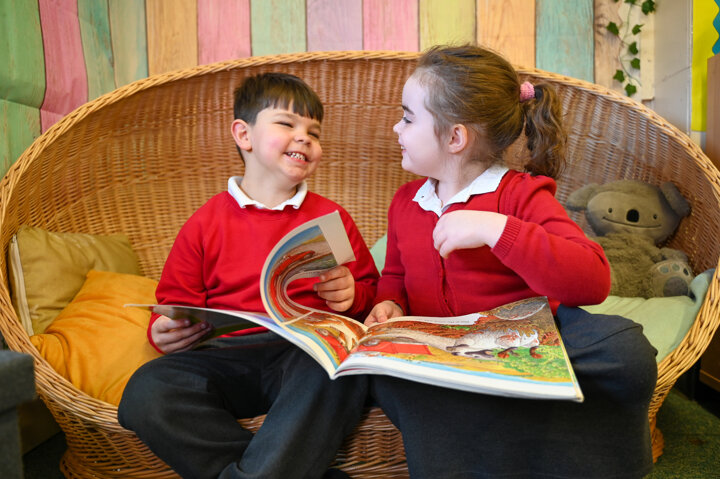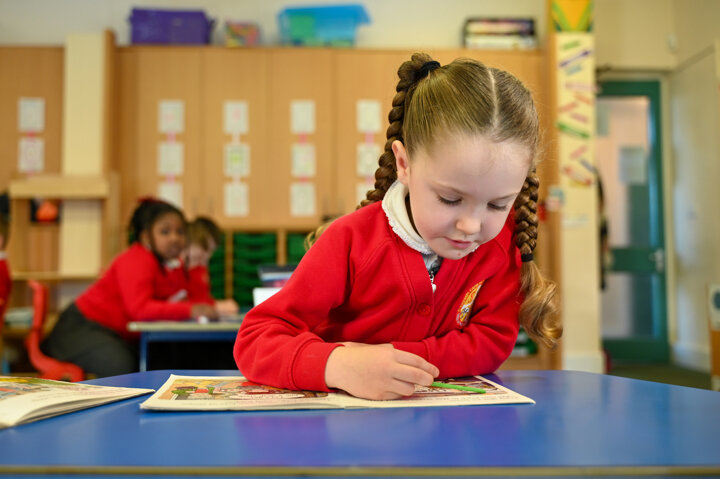Reading & Phonics
Subject Lead: Mrs Bradshaw
A warm welcome to our Reading and Phonics page. At St Joseph's, our curriculum has been designed to excite and inspire all of our children, ensuring it is purposeful, progressive and meaningful for every child. At St. Joseph’s Catholic Primary School, we believe that reading is the key for academic success. We value reading as a key life skill and are dedicated to enabling pupils to become lifelong readers.
Intent
At St. Joseph’s we intend for children to:
-
read fluently with a good understanding
-
read often for both pleasure and information
-
acquire a wide knowledge and vocabulary from a range of genres and text types
Implementation
Phonics
At St. Joseph’s we intend for all children to become confident readers and writers. We believe that phonics provides the foundations of learning to make the development into fluent reading and writing easier. The teaching of phonics is of the highest priority.
Phonic lessons at St. Joseph’s are taught following the Read Write Inc scheme. The sessions include:
-
daily direct teaching to children’s needs
-
a consistent approach
-
a secure, systematic progression in phonics learning
-
a maintained pace of learning
-
provide repeated practice
-
ensure application of phonics using matched decodable books
-
regular assessment
-
early identification of children at risk of falling behind, Fast Track to support ‘keep up, not catch up’
We teach ‘red words’ (tricky words). These are words that appear frequently in books for children and are usually learned using a whole word approach.
At the end of Year 1, children take the statutory Phonic Screening Check, this shows how well children can use the phonics skills they've learned. Any children who do not pass this test have one to one or small group interventions to continue and review their phonics journey in Year 2 and KS2.
For further information regarding the Read Write Inc scheme and learning to read at home, please visit the Ruth Miskin website.
At St Joseph’s we teach the National Curriculum for Reading, this ensures knowledge and skills are built upon each year. Teachers use a variety of texts and written material for group reading lessons, these often link to writing genres being studied or other curriculum areas being taught.
To support the development of early reading skills, EY and KS1 children will participate in three group reading sessions each week. During these sessions, children will have the opportunity to develop skills such as decoding, prosody and comprehension which in turn, will support children’s fluency and confidence when reading.
In KS2, children participate in four adult-led group reading sessions. Children will independently read the text in the first session, followed by an adult-led comprehension lesson. To ensure a holistic approach to reading comprehension and vocabulary, beginning in Year 2 we use VIPERS (vocabulary, inference, prediction, explain, retrieve and sequence/summarise) reading domains.
Written comprehension sessions happen on a weekly basis linked to either the book being studied in writing or to the group read text.
Beginning in Year 2, children access our online reading platform, Accelerated Reader, three times a week for thirty minutes. The platform recommends books for each child using their reading levels and individual interests. Once the children have read a book, they complete a quiz about the story which monitors their comprehension and extends their learning. Accelerated Reader can also be accessed from home.
Assessment
As well as day-to-day formative assessment as adults hear children read, and through questioning during discussions about group and class texts, children are assessed termly using the NFER tests.
Each time a child reads a book on Accelerated Reader, they take an online quiz and get immediate feedback.
Accelerated Reader monitors students’ reading practice and makes informed decisions to guide their future learning.
Star Reading online test is taken at the beginning of each term, it gives us access to an accurate set of data including:
-
Reading age (in years and months)
-
Zone of Proximal Development
Additional Support
Any children not making the expected progress in reading have access to a variety of interventions depending on their individual needs. A Star Reading test is completed at the start and end of an intervention period in order to measure impact.
How do we promote a love of reading?
-
Every day at 3pm, teachers read to their class to promote a love and enjoyment of stories, immersing them in the
world of imagination.
-
We have a wide range of group texts available and group reading sessions allow time for pupils to discuss their
reading, helping them to make sense of what they have read.
-
Reception and Key Stage 1 take home 3 books: 2 phonic decodable and one from the Lending Library to promote a love of reading.
-
Accelerated Reader has over 200,000 book choices which can also be accessed at home.
-
Pupils are encouraged to use class libraries and the library to access a wide range of books in addition to their reading book.
-
‘Morning Story’ choice, Early Years have two books to choose from each morning which will be read to them at the end of the day.
-
Children recommend their favourite books in ‘What Should I read next?’ books in KS2/suitcases in EY and KS1 go
home - children record with text and images their favourite book (this can be a book from home or school).
-
World Book Day promotes a love of reading; book in a box competition, book swaps, book sales, staff sharing their
favourite books, book cafe.
-
We have 2 reading clubs (EY/KS1 and KS2) which promotes reading for pleasure.
-
Each classroom has an attractive reading area where pupils can sit comfortably to read a book.
-
Starbooks, stay and read for children and parents termly.
-
MAT training by the English Hub for staff on how to share stories.
-
We have selected ‘Reading Crew’, their job is to promote a love of reading across the school. They help to run the lunchtime reading clubs. They monitor class reading areas, collect reading ‘treasure’ totals. They also ensure the outdoor reading books are used correctly.
Reading at Home
At St. Joseph’s, we have a home-school reading system where children take two books home to read which are at the appropriate level for them. For early readers children will take home three books:
-
Two Read Write Inc reading practice books. These books will be at the correct phonic stage for children. One book will have been read in school during Read Write Inc lessons, the other Book Bag Book will be new for children to read at home but links phonetically.
-
A sharing book. This book is to read and enjoy together.
Read as much as possible! We request that children in Reception read for 10 minutes each day at home, children in Year 1 & 2 for at least 10 -15 minutes, Year 3 & 4 for 15 – 20 minutes and Year 5 & 6 for 20 – 30 minutes. Reading Records are used to record home reading.
Impact
Pupils will enjoy reading across a range of genres.
Pupils of all abilities will be able to succeed in all reading lessons.
Pupils will be ready to read in any subject.
"There is more treasure in books than in all the pirate's loot on Treasure Island."
- Walt Disney

